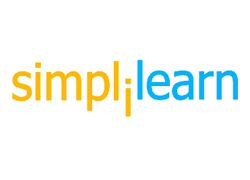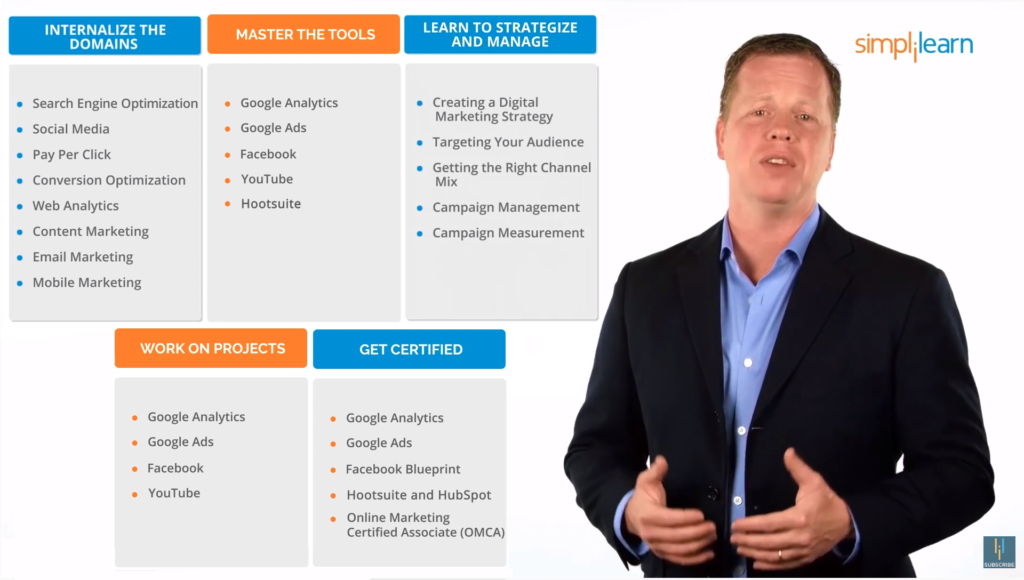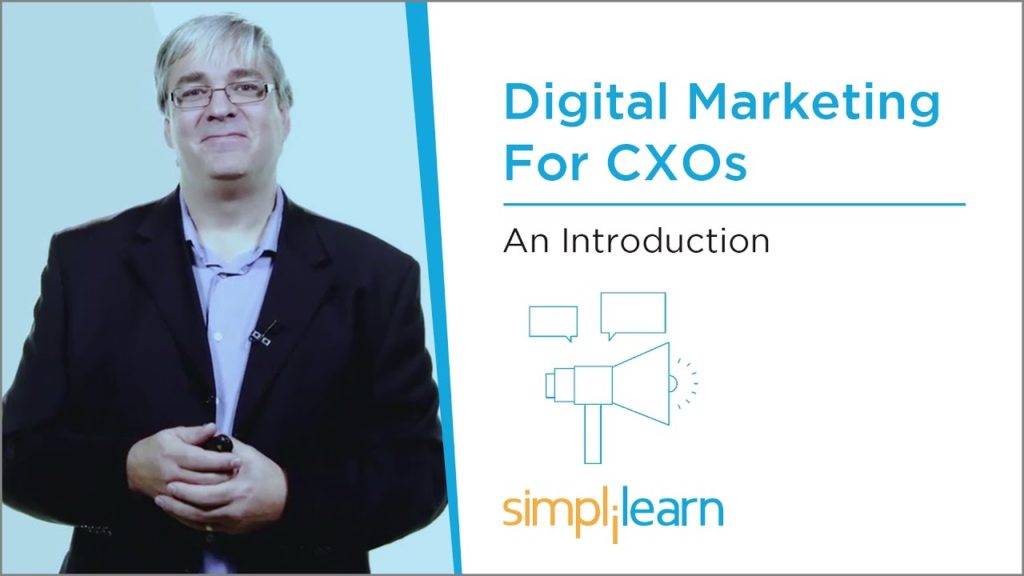Which digital marketing course should you choose?
One of the most common questions asked of OMCP is “Which Digital Marketing Courses are right for me?” In this special interview series, we interview seven leaders in digital marketing education to learn the differences.
Mark Moran, the Chief Marketing Officer with Simplilearn shared what to expect in Simplilearn’s digital marketing courses and where they are headed in the future.

Listen to the interview on iTunes or on Google Play
Michael:
All right. Welcome back to the OMCP studios and with us today is Mark Moran, the Chief Marketing Officer with Simplilearn, long time digital marketing veteran with some of the world’s leading companies. I’m your host Michael Stebbins and today we’ll be discussing digital marketing courses. Mark, welcome to the podcast. I’m glad you’re here.
Mark:
Hey Michael, great to be here. Thanks for having me.

Michael:
Now Mark, I know your role is to lead marketing, but first question really has to do with what drove the founders to get into the business of education and training and how did you come to join the company?
What got you into digital marketing training?
Mark:
Right. So Simplilearn’s been around almost 10 years now and our original founder who is still our CEO and driving the company is a man named Krishna Kumar, and he had just sold a previous company where he was a founder and he had started a blog on project management, which is his area of expertise. And over the course of 6 to 12 months, it evolved. It went from having a readership to having people asking more and more questions and saying, “Hey can I get on a chat with you, can I talk with you?” to then people asking, “Can you help me pass the exam?”.
Mark:
And in the case of project management, PMI, the Project Management Institute is the definitive certification body and this sort of cascaded and he realized, “Hey, this is a business,” and he also looked, starting in India, but really some of his first customers were in the US as well, and saw that this whole online training thing was really taking off. And so went from a personal passion project to really wanting to help people learn first in project management, and then it’s evolved to what we call digital economy skills, which includes digital marketing, cybersecurity, really anything that is driving sort of the modern economy is where we focus.
And so fast forward about three plus years ago and one of the board members approached me and I had just exited from a consumer e-commerce company and we had a fantastic exit, and was really looking to do something that was a little more mission-driven. I’d always been involved mostly in consumer web and started looking into this company, super interesting company. I hadn’t worked internationally, predominant number of our head count is out of Bangalore, India, and one thing led to another and I’m driving marketing here in San Francisco with a big team in India and folks all around the US. The whole mission is, I like to say, is keeping humans one step ahead of AI and robots, and keeping us all relevant and employed. So that’s what motivates me and gets me up in the morning.
Michael:
How would you or the company measure the success of the courses or programs that you’re offering right now?
Mark:
Yeah, we look at several different things.
Course Completion
- Course completion
- Material absorption
- Career advancement
First of all, are people actually consuming the course? So one of the key and very measurable measurements for us is course completion. Did you sign up, get motivated, get into it, and stay the course all the way through and really absorb the content? So we, and I’ll get into sort of how we’re this successful, but we see course completion rates well north of 50% and it has a lot to do with how we teach. When you think about some of the sort of big name … MOOCs is a term that we use in the industry, but people who are more primarily video based and most of those folks have completion rates in the teens, maybe in the low 20s if they’re lucky. So first thing, did you actually complete the course? And again, depending on the course, it could be as high as 70% plus completion rate.
Absorbing the Material
The second thing is, did you actually absorb the material? Did you learn something? And that’s where we look for partners like OMCP in digital marketing who have the authoritative and independent certification body. Did our course prepare you? And did you actually pass that certification? Along with certifications, we actually internally also do things like capstone projects that are part of the course itself and that allow a learner to turn around and say, “Yeah, I learned digital marketing and now let me walk you through this whole thing I had to do to pass the course,” and give them something to talk about in a job interview.
Advancing Careers
Then the third area that we look at is, is it advancing your career? And we really look at that in two different ways. One is during the course and then six months after the course, we survey every single student or professional and get their feedback, get their satisfaction score, and what’s known in the biz as the net promoter score, NPS, which we’re running in the mid 80s percent right now, which is super, super high. And then we’re also constantly getting those testimonials. Did you get a new job? Did you get a raise? To be honest, that information is a little more anecdotal because not everybody chooses to give us that kind of feedback, but we quantitatively look at did you complete it, did you get the certification, did you complete the capstone projects? Are you scoring us very highly on satisfaction? And then more of the qualitative and anecdotal and testimonial around did it really help you drive your career?
Michael:
Mark, some of the early surveys, and they are getting a bit old now, indicated that digital marketing folks who made it through the courses and completed them, averaged 16% higher salaries than those who did not. There’s probably newer data than that, but clearly another sign of success, and I love that you’re following up with folks on their careers. Speaking of that, who are the ideal candidates to sign up for the digital marketing courses?
Mark:
Right. So think of it fundamentally we have two kinds of courses.
Skill-Specific Courses
One is a very discrete course around a skill, or a topic. So, for example, social media marketing. I just want to know more about how to drive my business with Facebook and Pinterest and all the social media channels. So that’s a specific kind of course, and that’s got kind of different kind of folks who may be looking for that kind of a course. They tend to be people who are in that discipline but need to go much deeper, or who are coming into marketing absolutely fresh and they know they want to work with AdWords, they know they want to do analytics, they know they want to do social, and so they come in for, again, a discrete course. Those tend to be more in the three to six month range.
And again, I would say on average it tends to be earlier in their career, recent college grads, or people who are really transitioning from traditional, like offline marketing. So maybe you were doing PR before and now you want to be doing full social marketing. Those are very complementary. So you’re moving over and you just want to kind of bite off one topic. So that’s one profile.
Career Track
The other is really more career track oriented or what I think of as sort of full stack digital marketing and we have a couple of programs. Digital Marketing Specialist program is an example of that. This is really somebody who, ideally, is three to six years sort of into their career and they really want to broaden their options. So maybe you’ve been doing email marketing for several years and those in the business know that that is a particular category that people tend to burn out on after about two or three years of doing email over and over again or PPC or whatever it is. And now I want to be able to branch across that one channel and really be somebody who has deep analytical skills, understands page level optimization, wants to know content marketing, social, search, et cetera.
So again, they’re deeper into their career, they want to become more of a full stack 360 marketer, and often those are the people who are really thinking a step ahead. “How do I become a manager, an executive?” “I want, five years from now, to be the VP of Marketing and I really need to have this broad base of skills to be able to effectively do that role.” So these are the people that are at that point in their career when they’re thinking a couple of years ahead and that’s where they want to be going.
Michael:
Any leaning more towards B2B in an enterprise or leaning towards individuals and small businesses in terms of the digital marketing content?

Mark:
The digital marketing content, it’s really the full spectrum. I would say, if you looked at the jobs that are out there and available, there’s a slight leaning more towards people that are doing B2C that are working with big data sets and driving conversion funnels. So a classic be somebody in e-commerce that is using search and social and content to drive top of the funnel and then going all the way through and then going in the CRM and nurture campaigns and looking at lifetime value. So I’d say very much covers both, but I’d say there’s a little bit more of a preponderance of people that are operating in the B2C world. And I think that that overall is the case if you looked across the industry to job openings.
Michael:
It seems to match the ratio.
Mark:
Yeah, exactly.
What is Different In Simplilearn Courses?
Michael:
You have supported the OMCP teaching standard longer than any other education provider. I think it was around 2011, 2012 where the courses were teaching to the standards. Now you’ve had a lot of time to develop the content. Obviously we expect that you teach a super set of the standard. What kinds of things will participants find in Simplilearn courses that they’re unlikely to find anywhere else?
Mark:
Yes. We jumped on board early. If you go to our website, our tagline is Get Certified, Get Ahead. So we’ve really believed in this idea of being able to validate and verify learnings and outcomes. And I mentioned earlier, one of the things we track is course completion and I think that gets fundamentally to our pedagogy. There is phenomenal content, particularly related to digital marketing, all over the web. I could name you two dozen really great blogs, a number of the service providers, you know, take Moz for example, an SEO, you know, have incredibly great content. YouTube is chock a block full of it. The challenge is that most of it is in video format and you’re passively consuming it and yourself trying to curate it and figure out is this really current, is this really best practice?

Mark:
What we’ve done is move beyond sort of e-learning 1.0 which was all just straight video, and we have a fully immersive, what we call blended learning approach. So yes, we have those videos and you start with that to get sort of core concepts, and then really it’s all applied learning where you’re signing up and you’re in live virtual classrooms. Think of a webex kind of experience, but it’s fully integrated within our learning platform. And you’ve got teachers, you’ve got TAs, you’re interacting with fellow students. It’s very applied based, as I said, so we have labs, take AdWords, we have a simulator, you’re in there with a budget, you’re creating ads, you’re bidding, you’re running ROAS campaigns, you’re really getting fully immersed. And then we have again, capstone projects and alignment to third party certification, in this case OMCP, to really drive all that home.
- fully immersive, blended learning approach
- Content is most current
- Work with the leading providers in each digital marketing discipline
- Turning hundreds of hours of material into immersive applied learning experience
- Capstone projects
- Alignment to OMCP
Mark:
So our uniqueness is, yes absolutely our content is the most current, we work with literally the leading providers from around the world in each one of the sub-disciplines in digital marketing, but it’s really how we get you there. And it’s taking what could be 20, 40, 60, 100 hours of just staring at a video screen and turning that into a fully immersive, interactive, applied learning experience. That’s our differentiation.
Who else is doing great training?
Michael:
Other than Simplilearn, who do you think is doing it right? Who do you admire? Who do you think’s got it right?
Mark:
I think a lot of people do things really well and I also think there’s sort of two modalities of learning going on out there. One is, I’ll call it sort of snackable and that could even be, like in the world of programming, being on Slack and looking for a code snippet and a bit of advice, and Udemy certainly comes to mind if you’re looking for discrete, sort of small, you know, 20 hours, 30 hours, I want to know one subset or one discipline and at really pretty great price point. You know it’s a marketplace, they got some pretty amazing experts to provide that content. They certainly do that really well.
At the other end of the spectrum, several of the universities are really getting into this game, digital marketing is an area where some of them are doing quite well. We partner with Duke University for example, and help drive their digital media and marketing course, which is extremely popular. I can’t give their numbers because I’m not allowed to, but tons of people take that course and they’re seeing great outcomes. And so in that case you get a lot of benefits I talked about earlier, but then you also get the accreditation coming from somebody like a Duke University. So that works really well for some folks. Go to learnmore.duke.edu to find out more about that one. So those are two examples.
Michael:
We’ll be talking to Meredith as well, so maybe we’ll get her to share her numbers.
Mark:
They do really well with that course. Say hello to Meredith for me.
Simplilearn’s Position on Industry Standards
Michael:
If you were to talk about your position on industry certification and standards like OMCP, what are your thoughts on industry certifications?
Mark:
I think, clearly, OMCP has emerged as the defacto standard for what I am calling full stack digital marketing. I think it’s one thing to say to a hiring manager, “Hey, I’ve taken some online courses,” and it’s a very different thing to say, “I’ve taken digital marketing specialist at Simplilearn,” for example, “And I have my OMCP certification.”
Very different.
You might as well say, “I like watching videos about SEO.” It’s just very hard for a hiring manager to translate that without giving you all sorts of assessments and somehow calibrating what really you know or don’t know. So OMCP is a validation factor that’s super important for the recruiting part of the business.
The Future of Digital Marketing Training
Michael:
In terms of moving forward, I know your role is in the marketing leadership there, but I know you spend time with Krishna as well in planning the future. What are some of the visions that you’re seeing for the future of digital marketing training from Simplilearn?
- More pedagogy and learning structure
- Applied learning for major platforms and vendors
Mark:
Yeah, so you know, I think two things there. One, we really believe in our pedagogy and we are seeing a number of other competitors, if you will, sort of moving away from just sort of a pure video experience. So, I think that interactivity is critical and is becoming an industry trend. I think the other thing you’re seeing more of, and that’s really important, is familiarity with the major platforms and vendors, such as Google Analytics and Google AdWords, HubSpot, Tableau, et cetera, you know, Salesforce, because you can’t … Very quickly what is abstract needs to become applied, and if you’re doing email and aren’t familiar with some of the major email providers, or God forbid… PPC, and haven’t actually gone into AdWords, that’s fairly incomplete.
And so I know for us what that’s meant is deeper and deeper partnerships with, I’ll call it now big tech for sure, the Microsofts and Googles and Amazons of the world, and then all the boutique providers in all the sub specialties and giving you, along with that core set of knowledge and those labs and projects, direct exposure to some of the major vendors. And I think that’s truly an emerging trend more broadly.
Michael:
And OMCP honors what we call “platform certification” by granting professional development units and in some cases renewal of certification, based on participation and completion of those as well.
Mark:
Yeah. And that’s the right approach.
Stats Blitz
Michael:
How many participants have gone through the digital marketing courses in the last three years from Simplilearn?
Mark:
That’s a nice easy number to remember. We’re really right at about 10,000 people worldwide.
Michael:
Okay. Just in three years. That’s impressive. And how many graduates?
Mark:
It’s a little over 6,000 of those 10,000 have made it all the way through and graduated.
Michael:
Okay. How many hours, if you can add it all up, how many hours of training in digital marketing in the programs from Simplilearn?
Mark:
Oh wow. So individual courses range from 25 hours up to 350 hours, and I actually didn’t do the average math across that, but I think we’re talking in the range of about two million hours, give or take.
- 10,000 in digital marketing trailing three years
- Over 60% complete all coursework
- 25-350 hours of training in digital marketing available
Michael:
Two million hours might apply to how many hours people have experienced. I think what I’m looking for is didactic. If somebody were to take a social media course, for example…
Mark:
Right, right. So again, it’s in the range, depending on if it’s one of those discrete and more introductory courses, it would be around 25 hours, but for most you’re talking under a hundred hours, like 80 to a hundred hours for most of the full stack kind of courses that we offer.
Michael:
And so definitely hundreds of hours if somebody wanted to go full stack and as little as maybe 16 to 24 if they just were trying to get a overview of a single discipline. Is that close?
Mark:
That is very close. I’m willing to take that.
Michael:
Okay. All right. Well, we’ll encourage our listeners to go and check the current numbers because we do know those courses are constantly changing with updates. And you do have to ask didactic, listeners, ask for didactic hours because just counting the video lecture hours isn’t really enough because you do have, as Mark described, capstone projects, you have interactions with some of the specialists, and that all really does count towards what’s available in those courses.
Mark:
Yeah. Absolutely.
Michael:
What is a stat you’d like to share that we didn’t ask for, Mark?
Mark:
Well let’s see. I’m going to share a stat that theoretically I would have to kill you for sharing because it’s super top secret, but I’m going to share it anyway. We are just completing a major survey with one of the predominant survey houses. I won’t name them because it hasn’t been published yet, but I will do a sneak peak of one of the core findings. So this was a survey of learning and development leaders at over 250 US companies, and it was comparing again what I call blended learning to more traditional say video-based or even in person, classroom based training. And the findings were that this blended learning approach is 66% more effective in driving business outcomes. So that is hot, hot off the presses. Don’t, don’t tell anybody I told you because it actually hasn’t even hit the press yet.
Advice for Digital Marketing Professionals
Michael:
When we’re published here we’ll try and time it properly. You heard it first here on the OMCP podcast. Any advice for learners out there who are taking on digital marketing?
Mark:
Yeah. Well so first of all, the nice thing is that digital marketing covers a lot of sub-disciplines and particularly depending on where you are in your career, really find an area that you’re truly passionate about. And along with that, and if you have to push yourself in this direction because you’re not genetically wired that way, you do also want to ground yourself in things like Google Analytics and AB testing and quantitative analysis because that’s the world we live in, and opinions are great, but really all great marketeers are very, very data-driven. So combine a sub area, particularly if you’re early in your career that you’re passionate about, and then get super data-driven, and then embrace lifelong learning. We’re in a world, digital marketing, every year there’s a new platform, you know, is WhatsApp now going to be the hottest B2C platform for most of the world? I’m not sure, possibly.
- Find an area you are passionate about
- Get super data-driven
- Pick a sub area if early in career
- Embrace lifelong learning
Mark:
And you can’t stay static, and for most people doing your day job isn’t enough to really keep you current and to keep you accessing what’s truly the latest and greatest. So lifelong learning is particularly critical. And I’d say just stay curious and don’t be afraid to fail because as you’re experimenting and stretching your boundaries and going from sort of a single skill practitioner to a full stack marketer, now there’ll be bumps along the road, and zigs and zags and that’s expected, and learn from those failures, and you’ll do great.
Michael:
Mark, I want to make sure people know where they can sign up for the courses. Can you state just here for the transcript and for the podcast, where should people go sign up for these digital marketing courses from Simplilearn?
Mark:
That would be Simplilearn, with no Y, Simplilearn.com .
Michael:
I’m your host Michael Stebbins, and you’ve been listening to the OMCP Online Marketing Best Practices podcast with a special session about digital marketing training. OMCP maintains its certification standards for the online marketing industry in cooperation with industry leaders just like Mark, and with Simplilearn. Mark, thank you so much for joining us today.
Mark:
Michael, it was great. I really appreciate it.
Podcast: Play in new window | Download
Subscribe: Apple Podcasts | RSS
Now it’s a real time to explore and educate the mass towards Digital Marketing Education specially in India and Job oriented as well as entrepreneurship courses would be much effective in this critical situation during COVID 19.